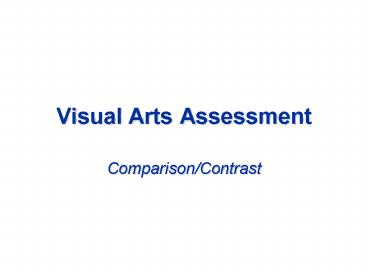Visual Arts Assessment
1 / 5
Title: Visual Arts Assessment
1
Visual Arts Assessment
- Comparison/Contrast
2
TASK
- (Your final answer is to be written on the
open-response paper provided on your clipboard.)
Remember comparesimilarities
contrastdifferences - Study the works of art on the next two slides.
Read the history behind the creation of the
pieces. - A) Compare the two works of art. Express
yourself using the language of the elements and
principles of art and other artistic terminology. - B) Contrast the two works of art. (Use
appropriate vocabulary.) - C) Are these pieces more similar or more
different? Why? - D) What factors contributed to the similarities?
the differences?
3
Guernica by Pablo Picasso, 1937
This painting by Picasso was created after a
small village in Northern Spain was used for
bombing practice for three hours by Hitlers air
force on April 27, 1937. After the attack, which
was supported by the Spanish dictator, Franco,
the village of Guernica burned for three days and
1600 civilians were killed or wounded. Enraged
after seeing the stark, black and white photos of
the destruction, Pablo Picasso painted this piece
in his Paris studio as a protest.
4
Detail from the fresco at the Scrovegni Chapel in
Padua by Giotto, 1305
This painting by Giotto details the mothers of
the children killed by King Herod. It is part of
a larger frescoa style of painting in which the
artist paints on plaster. Giotto painted on wet
plaster rather than dry to allow the color to
penetrate deeply into the plaster. Visit Italy
and you can see this fresco at the Scrovegni
Chapel in Padua.
5
Scoring Guide
- 4Answer includes every component mentioned in
the score of 3, but goes above and beyond in
insightful reasoning and appropriate vocabulary. - 3Response includes both comparison and contrast
of the two pieces using appropriate vocabulary.
Reasoning is explained. An opinion of whether
the two pieces are more alike or different is
given and is logical. Contributing factors for
both similarities and differences are given and
are reasonable. - 2Most, but not all of the parts are answered
correctly. - 1Only a small part of the answers are given.































